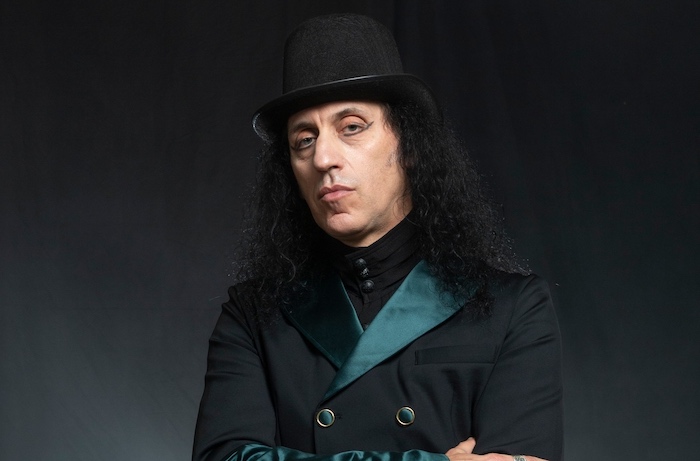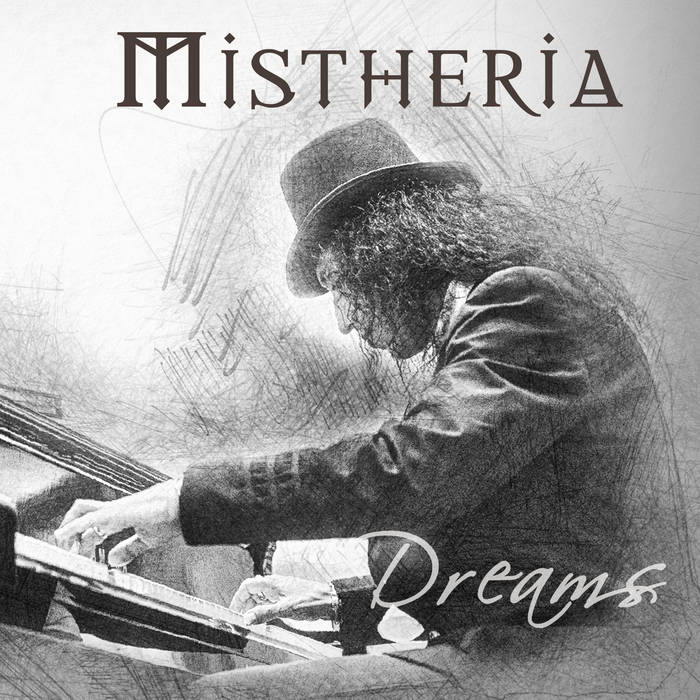Mistheria - Interview
Music has the power to take us to unimaginable places, shaping our lives in unique and surprising ways. For Italian Mistheria, this journey began early, influenced by his father's love of music. From his first chords on an accordion at the age of six to his graduation from the music academy in Italy, he found his passion and his voice in the keys. In this interview, the keyboardist of Bruce Dickinson takes us through this trajectory of musical discovery and shares his experiences from his first influences to his most recent collaborations and soulful songs, including "The Mandrake Project," the recently released solo offering from the Iron Maiden frontman.
Marcelo Vieira

First of all, why did you choose keyboards?
That's quite simple. When I was a child, around six years old, my father, who is still a music lover, put an accordion on my lap, and that's how I started with music. Then, I entered music school in Italy, and here I am now, yeah, who would have thought?!
Italy has a strong tradition in epic and symphonic heavy metal. Could you talk a bit about the artists and bands from your country that first and most influenced you to become a musician?
I entered the metal scene a bit late because I was studying at music school, so I was around 20, 21 years old when I started composing and playing metal for real. Before that, I just listened to some albums here and there randomly because I studied eight, ten hours a day, so I really didn't have time for anything other than classical music. At that time, I started listening to bands from Italy, like Labyrinth and Vision Divine, which were basically the most well-known at the time and opened my eyes to symphonic metal. Later on, I discovered other bands [from other countries] like Nightwish, Epica, and Stratovarius.
Your discography includes over 100 albums, including your own productions and those of other bands, spanning from classical music to metal, new age to soundtracks, pop to rock. Which of these styles is your favorite to play?
It's hard to choose because I only play what I like, so it can be anything from disco music to pop songs. Being a classical musician, I love combining classical music with other styles. That's why I also started my Vivaldi Metal project, which is a symphonic and cinematic metal project where I combine classical music and metal, but also in my discography, as you said, there are soundtracks because I also love composing.
Your most recent and notable collaboration was with Bruce Dickinson on the newly released "The Mandrake Project." Would you say this is a case of a fan becoming a bandmate?
You could say that. When I started listening to Bruce's solo albums, it was around 1993, 1994, something like that. Then, later on, I made a trip to the United States, stopped in Florida, where I met Rob Rock, who was being produced by Roy Z at that time. And then, after that meeting, I received a call from Roy asking to record on an album of Bruce's, which was quite surprising and unexpected. So, it's kind of funny that we became bandmates. Many years have passed [since then], over two decades.
From a musical composition and thematic background standpoint, what aspects would you highlight in "The Mandrake Project" that make it so special?
Perhaps the cinematic, theatrical, somewhat dark atmosphere that influenced the entire album, all the compositions, and some of the songs have, of course, a good amount of sounds from me that highlight these atmospheres they asked me to emphasize. That combination between metal and soundtrack is what I like the most [about this album]. Compared to Bruce's previous albums, of course. Also, the guitar work and the composition itself are amazing, but these cinematic elements may be new to Bruce's albums, so I was very, very happy to work on that side of the album.
Do you feel the band manages to convey the cinematic elements of the album to the stage?
Without a doubt. We are doing the show without any playback, no pre-recorded backing tracks, nothing; it's all live, and the band is, modesty aside, on fire. With each show, we're getting even more in sync, and the sound is killer, also thanks to the amazing sound engineers we have, who are like the seventh member of the band.
How has the tour been going so far?
The tour has been amazing. We had a great start in Los Angeles, and so far, we've had shows in Mexico and Brazil. We've been getting several reviews, and I must say I've only read positive comments about the tour, so I'm very happy.
Did the Brazilian audience meet your expectations, in particular?
I would say they even exceeded expectations. I know everyone was excited because before we arrived in Brazil, we received many messages and comments from people who were eagerly waiting for the show and ended up making our time in the country a wonderful experience. It all feels like a dream.
Although you've never been to Brazil before, what do you know about the culture and especially the music here?
I have friends from Brazil, some of them even live in Italy, and others I met during my time in Los Angeles, so I already knew a bit about Brazilian culture, but of course, I know much more about the music, traditional and modern, and metal. Just to name a few, I'm friends with the guys from Angra; Edu Falaschi, whom I performed with in some concerts in Italy, and Felipe Andreoli; Andreas Kisser from Sepultura and many other musicians. The Brazilian metal scene is well known in Europe.
After the tour ends, what are your plans?
After the tour ends [in August], I'll take a vacation in Italy and then I'll go back to my two projects, Vivaldi Metal, with which I should have some shows by late September, and my solo metal album, which is still in progress. Those are, for now, my two artistic goals for this year, besides, of course, teaching and producing and my partnership with Yamaha, for which I record keyboard and piano demonstrations. But the first thing after the tour will be to spend a few weeks by the seaside in Italy. [Laughs.]
To wrap up, if I asked you to recommend some albums to get to know remarkable keyboards and pianos in rock and metal, which ones would you recommend?
I would recommend albums from the bands and keyboardists that influenced me the most, so I would start with "Burn" (1974) and "Machine Head" (1972) by Deep Purple, as well as anything else they did with Jon Lord, who is simply one of my idols, so the Purple [albums with Lord] discography is mandatory to know how to use keyboards in rock and metal. Then, I would mention my second biggest influence, Keith Emerson from Emerson, Lake & Palmer. "Tarkus" (1971) is their darkest album; it's something amazing, especially for that time. Closer to our times, there's Dream Theater, especially [the albums] "Images and Words" (1992) and "Awake" (1994); great keyboard works [by keyboardist Kevin Moore]. The first metal album I listened to, upon a friend's suggestion, was "Trilogy" (1986) by Yngwie Malmsteen, and Jens Johansson is an incredible keyboardist. Finally, I would like to mention my dear colleague, who unfortunately left us too soon, Vitalij Kuprij. He has two amazing albums, "High Definition" (1997) and "Extreme Measures" (1998), which really highlighted keyboards in metal in an impressive way.
Upcoming Releases
- Morrath - Obscure Abominations - Feb 25
- Chalice - Divine Spear - Feb 27
- Blackwater Drowning - Obscure Sorrows - Feb 27
- Vide - Aux Enfants Des Ruines - Feb 27
- The Leaving - The Leaving - Mar 06
- Serpent Icon - Tombstone Stories - Mar 06
- Insect Inside - Reborn In Blight - Mar 06
- Triumpher - Piercing The Heart Of The World - Mar 06
- Lömsk - Act II - Of Iron And Blood - Mar 06
- God Against Humanity - The Judgement - Mar 06
- Miserere Luminis - Sidera - Mar 06
- Gravemass - This Is The Way - Mar 06
- No/Más - No Peace - Mar 13
- Monstrosity - Screams From Beneath The Surface - Mar 13
- Against I - Anti Life - Mar 13
- Empire Of Disease - While Everything Collapses - Mar 19
- Hanging Garden - Isle Of Bliss - Mar 20
- Putred - Blestemul Din Adânc - Mar 20
- Gaerea - Loss - Mar 20
- Diatribes - Degenerate - Mar 20

